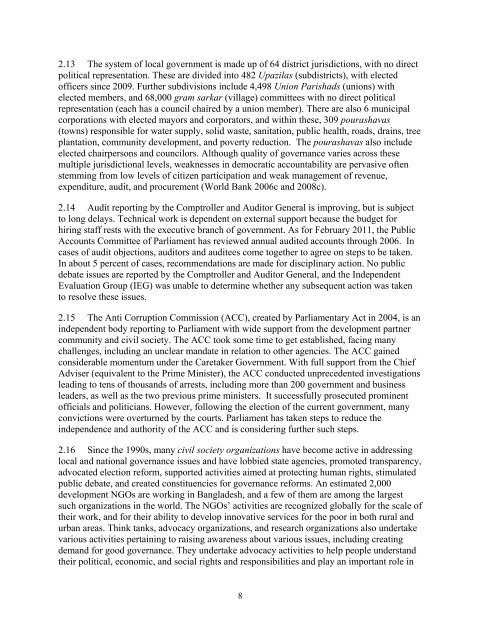Bangladesh - Independent Evaluation Group - World Bank
Bangladesh - Independent Evaluation Group - World Bank
Bangladesh - Independent Evaluation Group - World Bank
You also want an ePaper? Increase the reach of your titles
YUMPU automatically turns print PDFs into web optimized ePapers that Google loves.
2.13 The system of local government is made up of 64 district jurisdictions, with no direct<br />
political representation. These are divided into 482 Upazilas (subdistricts), with elected<br />
officers since 2009. Further subdivisions include 4,498 Union Parishads (unions) with<br />
elected members, and 68,000 gram sarkar (village) committees with no direct political<br />
representation (each has a council chaired by a union member). There are also 6 municipal<br />
corporations with elected mayors and corporators, and within these, 309 pourashavas<br />
(towns) responsible for water supply, solid waste, sanitation, public health, roads, drains, tree<br />
plantation, community development, and poverty reduction. The pourashavas also include<br />
elected chairpersons and councilors. Although quality of governance varies across these<br />
multiple jurisdictional levels, weaknesses in democratic accountability are pervasive often<br />
stemming from low levels of citizen participation and weak management of revenue,<br />
expenditure, audit, and procurement (<strong>World</strong> <strong>Bank</strong> 2006c and 2008c).<br />
2.14 Audit reporting by the Comptroller and Auditor General is improving, but is subject<br />
to long delays. Technical work is dependent on external support because the budget for<br />
hiring staff rests with the executive branch of government. As for February 2011, the Public<br />
Accounts Committee of Parliament has reviewed annual audited accounts through 2006. In<br />
cases of audit objections, auditors and auditees come together to agree on steps to be taken.<br />
In about 5 percent of cases, recommendations are made for disciplinary action. No public<br />
debate issues are reported by the Comptroller and Auditor General, and the <strong>Independent</strong><br />
<strong>Evaluation</strong> <strong>Group</strong> (IEG) was unable to determine whether any subsequent action was taken<br />
to resolve these issues.<br />
2.15 The Anti Corruption Commission (ACC), created by Parliamentary Act in 2004, is an<br />
independent body reporting to Parliament with wide support from the development partner<br />
community and civil society. The ACC took some time to get established, facing many<br />
challenges, including an unclear mandate in relation to other agencies. The ACC gained<br />
considerable momentum under the Caretaker Government. With full support from the Chief<br />
Adviser (equivalent to the Prime Minister), the ACC conducted unprecedented investigations<br />
leading to tens of thousands of arrests, including more than 200 government and business<br />
leaders, as well as the two previous prime ministers. It successfully prosecuted prominent<br />
officials and politicians. However, following the election of the current government, many<br />
convictions were overturned by the courts. Parliament has taken steps to reduce the<br />
independence and authority of the ACC and is considering further such steps.<br />
2.16 Since the 1990s, many civil society organizations have become active in addressing<br />
local and national governance issues and have lobbied state agencies, promoted transparency,<br />
advocated election reform, supported activities aimed at protecting human rights, stimulated<br />
public debate, and created constituencies for governance reforms. An estimated 2,000<br />
development NGOs are working in <strong>Bangladesh</strong>, and a few of them are among the largest<br />
such organizations in the world. The NGOs’ activities are recognized globally for the scale of<br />
their work, and for their ability to develop innovative services for the poor in both rural and<br />
urban areas. Think tanks, advocacy organizations, and research organizations also undertake<br />
various activities pertaining to raising awareness about various issues, including creating<br />
demand for good governance. They undertake advocacy activities to help people understand<br />
their political, economic, and social rights and responsibilities and play an important role in<br />
8

















